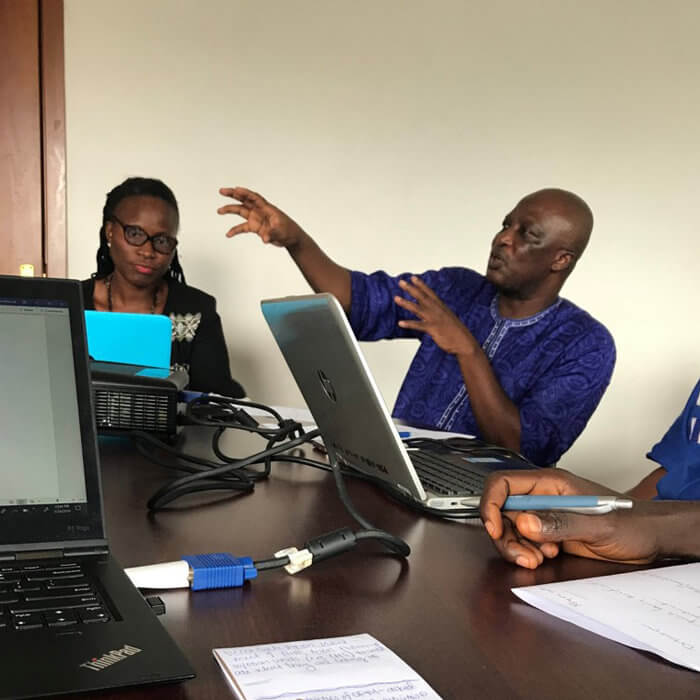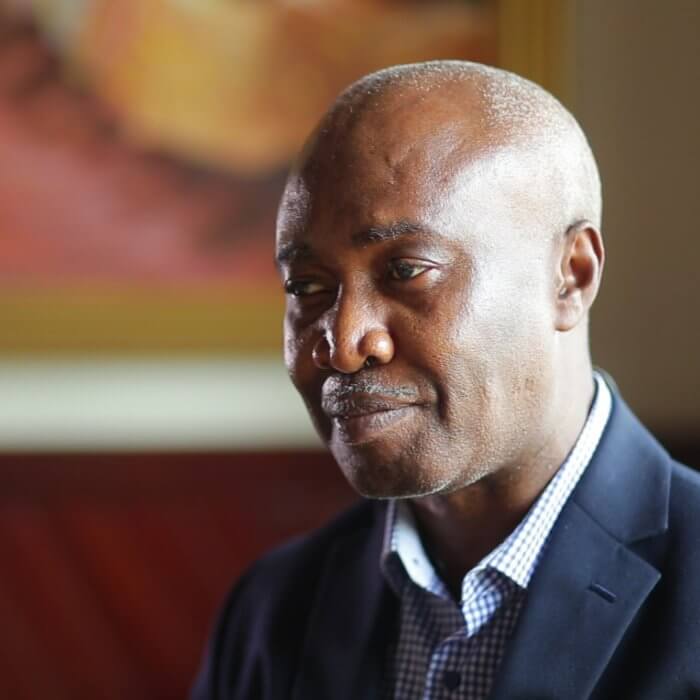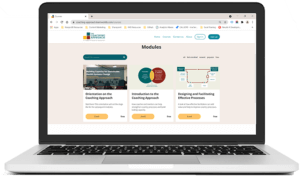The Coaching Approach: Changing the way development assistance is done
There are lots of ways organizations and businesses are navigating new realities of operating during the COVID-19 pandemic. And, as weeks turn into months, many are finding new and more efficient ways to communicate and work with one another.
But how do you pivot when your work involves supporting people in governments and civil society around the world to advance universal health coverage and other health system goals? When you can’t physically be there in person, what can you do and who can you tap to step in?
Long before COVID-19 grounded flights and life as we knew it to a halt, my colleague, Allison Kelley, and I argued for better approaches to development assistance that relied less on fly-in/fly out work, or traditional technical assistance (TA). The focus on technical solutions left too many technical experts driving the agenda on a project-by-project basis.
“We must do better at supporting robust, inclusive country-led processes and investing in and facilitating capacity-building for institutions and individuals. We also need to pay more attention to strengthening strategic communications and stakeholder engagement, as well as creating more opportunities for effective cross-country collaborative learning.” —“3 shifts are needed in the global health community”
As a health economist at Results for Development, my team and I support local partners in addressing complex health financing challenges — through the Strategic Purchasing Africa Resource Center (SPARC), the African Collaborative for Health Financing Solutions (ACS), the Health Systems Strengthening Accelerator and the Learning Network for Countries in Transition, among others. The ultimate goal of this work is to ensure governments can build and maintain stronger health systems that can provide high-quality health services to each of their citizens; and, in turn, their citizens can access those services at the moment they need them and without financial hardship.
To see better health outcomes and lasting improvements, you need strong health systems. But how do you support country partners in making that happen? That kind of change doesn’t come about with traditional approaches to TA alone. With traditional TA, you can get a good policy enacted or a new approach adopted — but that alone doesn’t make the system stronger. And that’s our goal.
When R4D shifted its mission a few years ago to focus on supporting change agents to achieve lasting systems change, we conducted a listening tour. We spoke with change agents across a range of countries to better understand the kind of support they were looking for. Many said they wanted greater access to experts who had experience in contexts that were similar to theirs, and they wanted more focus on lasting capacity building.
In response to this feedback, the coaching approach was born.
A group of us at R4D committed to responding to our country partners in a concrete way. We engaged in a process over the past two years to co-produce a new approach to TA with country and regional experts from around the world. This approach, which we dubbed “the coaching approach,” builds on good practices that many of them were already carrying out in their day-to-day work supporting change in country health systems.
What is the coaching approach and how is it different from traditional TA?
The first feature of the coaching approach is related to “who” provides the support. This approach is carried out by a coaching team, often a mixture of country and regional experts supporting the country partners, who bring in global experts and other technical resources as needed.
The second feature of the approach is related to “how” the support is provided. The coach does not do the work directly, but rather stands side-by-side with country partners and provides support, advice and contextualized evidence along the way. We recognize that countries have their own processes in place to make decisions, implement policies, and carry out all of their other day-to-day functions. A key feature of this approach is that we’re not creating parallel processes, structures or institutions, and we avoid ready-made solutions, models, and rigid advice.
Early experience tells us country change agents appreciate the coaching approach.
This approach sounds good in theory, but does it actually work? We’re still testing it, but early proof points are positive. For example, in Kenya, Nathaniel Otoo has been providing coaching support for an expert panel charged with reviewing Kenya’s National Hospital Insurance Fund (NHIF) to, ultimately, transform and reposition the NHIF to play a key role in achieving Kenya’s universal health coverage goals. Mr. Otoo brought his extensive experience as the former CEO of Ghana’s National Health Insurance Authority (the institution that oversees Ghana’s national health insurance system) to the challenges in Kenya. He was well respected from the beginning, because he had relevant experience from a similar country context with a well-respected health insurance system.
But most importantly, Mr. Otoo listened carefully and used his experience to guide the expert panel toward home-grown solutions appropriate for Kenya. Gilda Odera, a former NHIF board member who worked with Mr. Otoo on the review, said she appreciated his approach of taking a backseat throughout the process and only speaking when he felt they were veering off track.
“He’d never point out and say, ‘You’re going in the wrong direction’ or ‘You’re doing this wrongly,’” she said. “He’d always say in a very subtle way, ‘Have you considered this, have you looked at this.’ And then pulled back immediately and watched us debate and deliberate. I thought that was very interesting, because whenever he’d do that, our minds would open. And we’d realize, well, we never thought about that … and he threw it back on us to think.”
In Liberia, senior Ministry of Health officials were interested in starting up a national health insurance program, and they were eager to hear about Anthony Gingong’s experience in Ghana. Mr. Gingong established the Quality Assurance and Provider Payment units within the National Health Insurance Authority. He also provided Liberian officials with guidance on everything from provider payment and policy considerations to the effectiveness of revolving drug funds.
“Gingong was able to guide us through when we were talking about the Revolving Drug Funds. We all had a different idea, but Gingong was able to put it all into perspective based on his experience in Ghana,” said Nuaker Kwenah, a health financing officer in the department of Planning, Research and M&E at the Liberian Ministry of Health.
Scaling up and sharing the coaching approach
Now, we’re aiming to scale up the approach and engage more country and regional experts in a community of coaches and mentors in three ways:
1. Orientation to the coaching approach through e-learning modules.
The coaching approach means embracing a new way of working compared with past TA approaches. Moving in this direction requires some agreement on common principles — for the funders, for the coaches, and for the change agents themselves. We all have to work together a bit differently.
To help introduce and build momentum around this approach, we worked with Amref Health Africa’s eCampus team to develop a virtual orientation to the coaching approach. The orientation is a series of e-learning modules in which coaches themselves share the principles, approaches and some tips for playing the role of coach most effectively.
Module 1. Introduction to the coaching approach. The first module provides an introduction to the approach and how coaches can help strengthen country processes and build lasting capacity through this approach.
Module 2. The next modules dive more deeply into specific functions that coaches can support that help make country processes more effective, starting with process facilitation.
Additional modules will be developed to support coaches on other important functions, such as knowledge translation and strategic communications.
Remote coaching module. The COVID-19 pandemic has changed everyone’s ability to work in person and provide coaching support in the way the approach envisions, so we will be adding a fifth orientation module devoted to providing technical support remotely through virtual engagements. We will collect good practices from our community of experts and provide tips for adapting the coaching approach to the new ways of working.
2. Matching experts with country needs through a global database.
The coaching approach is not just about adopting a new process for supporting technical knowledge transfer and systems strengthening — it’s also about “democratizing” the process of matching experts with people who need expertise. Right now, donors and implementing organizations tend to rely on the same local and regional experts over and over again, despite the fact that there is a growing pool of people in low- and middle-income countries who have valuable systems strengthening insights and experience. One of the challenges is that there is no easy way to find these experts — and that’s why we’ve developed a publicly available, online database of individuals and institutions with expertise in health systems strengthening. The database will allow experts to highlight both their technical expertise, and their “soft skills” in coaching and mentoring. Initially, the database will focus on building a pool of health experts, but we hope to expand it later to other areas of expertise.
3. Collaborative learning on the coaching approach.
We want to be sure that we build knowledge about what works well and what are the challenges with this approach so we can always improve the support we provide for country partners. We are asking country, regional and global experts to document and share lessons learned and exchange helpful tips as they apply this approach. In sub-Saharan Africa, a community of health systems experts interested in sharing and learning around the coaching approach has already emerged. Our hope is that more communities like this will also form across other sectors and regions to continue providing thought leadership around this approach. Stay tuned for additional information, as we develop ways to share knowledge and conduct collaborative learning sessions.
As Allison and I shared in our blog two years ago, we recognize that these shifts in how we support country partners to achieve health system goals will also require an evolution in how development partners define and measure the results of their support. As we are seeing in the midst of the global COVID-19 pandemic—we cannot do business as usual; we must do better. We invite other global and regional partners to join in this movement and hold ourselves accountable for providing valuable technical support that helps solve the immediate challenges identified by our country partners themselves, while building lasting capacity for stronger, more resilient health systems.
To learn more, visit www.thecoachingapproach.org.
R4D’s Yoriko Nakamura, Agnes Munyua and Tayo Willoughby contributed to this post.
















